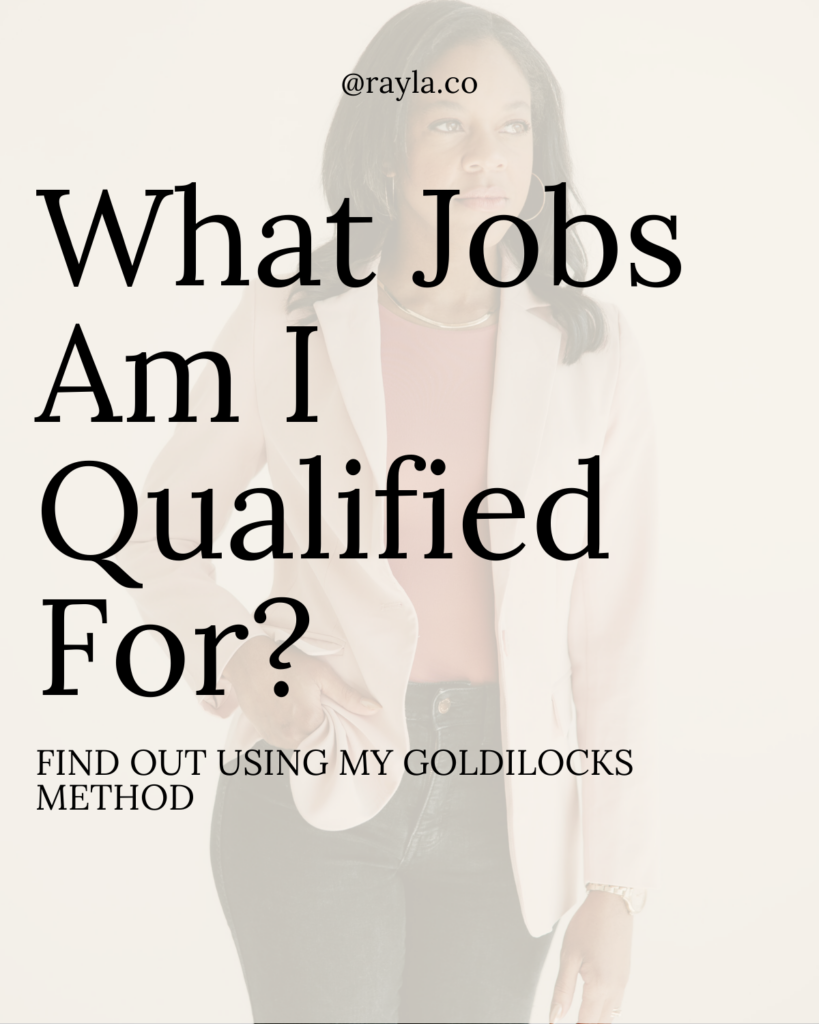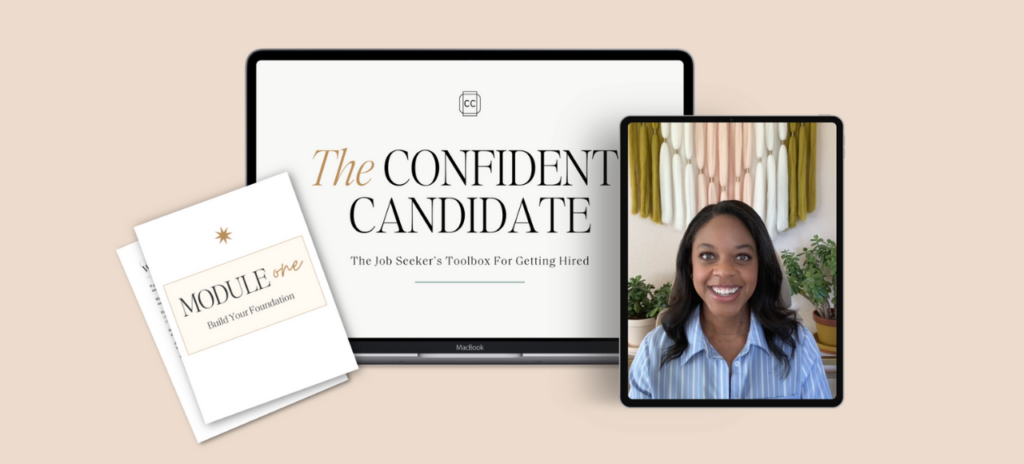You found a job listing that feels like it was made for you. It checks every box on your dream job list. Your fingers are hovering over the apply button.
Then doubt creeps in.
What jobs am I qualified for?
Job descriptions are intentionally vague. They list skills, experience, and qualifications that sometimes seem more like a wishlist than a job requirement.
You wouldn’t believe how many people skip a job application because they think they’re unqualified—when they should be contemplating how they can negotiate a six-figure salary.
Let’s figure out where you fall using my Goldilocks Method to determine if you’re underqualified, overqualified, or just right for the job.
LEARN MORE: The Most Common Resume Summary Clichés (VIDEO)
Are You Underqualified?
If you’re missing one or two qualifications, it doesn’t mean you’re underqualified for a job.
Employers rarely expect a perfect match. The key is identifying whether the gaps are manageable or deal-breakers.
This is where it gets tricky, not because you can’t analyze your skillset, but because of your imposter syndrome.
When I got my Master’s degree, the last thing I expected to find myself thinking was, “What am I qualified for?”
But that’s exactly what came to my mind in 2023, my freshly printed Master’s in Human Resource Management hot in my hands.
Oddly enough, I think it’s more likely that you’ll find yourself wondering if you’re underqualified or overqualified for a job the longer you’ve been working.
When you have multiple degrees, experience in various jobs, or you’ve industry-hopped, you start overthinking which titles you qualify for with such a diverse set of skills.
But the secret to landing your dream job isn’t about searching for a title you think you’re qualified for.
If you find yourself missing just a couple of skills or experiences mentioned in the job posting, you’re probably still in the game.
I mean, who hasn’t applied for a job thinking, “Eh, maybe I’ll learn on the job”?
3 Signs You’re Underqualified (With Examples)

1. You Need Just a Few More Years of Experience
The job asks for five years of experience, but you only have two.
Example: A hospital is hiring a lead surgical nurse with five years of experience. You’ve only assisted in surgeries for two years.
2. You’re Missing Crucial Software Skills
You only have basic experience in a required tool or software that’s mandatory for the job.
I’m not talking about small software skills here. If you know how to use Canva and the job you want requires Adobe proficiency, it doesn’t mean you’re unqualified for the job.
(that’s what we call a transferable skill)
Here’s when transferable skills don’t work:
Example: A construction firm needs a structural engineer proficient in AutoCAD and Revit. You’ve used AutoCAD but never worked with Revit.
3. Your Tangible Results are Low
It’s simple: you haven’t yet reached the results they’re asking for.
Example: A financial firm seeks a risk analyst who has reduced portfolio risks by 20%. You analyze risks but have no proven reduction records (not even by 5%).
When You Should Apply Anyway
- Potential for Growth: Employers don’t expect candidates to meet every requirement perfectly. If you can demonstrate adaptability and willingness to learn, you’re still a strong contender.
- Transferable Skills: Experience in similar roles, even in different industries, can often bridge the gap. For example, if you’ve managed safety compliance in one industry, you may still qualify for a compliance role in another.
- Demonstrate Willingness: Expressing a strong interest in learning the missing skills—whether through certifications, mentorship, or training—can make a difference.
LEARN MORE: How To Write A Resume for a Career Change
Are You Overqualified for the Job?
Being overqualified for a job is like bringing a five-star chef to a fast-food job interview.
Sure, you can handle the frying, but they might wonder why you’re not cooking at a five-star restaurant instead.
Employers will worry you’ll get bored, leave quickly, or expect a higher salary, which is why your resume ends up in the “no” pile.
4 Signs You’re Overqualified (With Examples)

1. Excessive Experience
Your experience level is far beyond what’s required.
Example: A small clinic is hiring a general physician with three years of experience. You’ve been a senior attending physician for 15 years.
2. You Have Higher-Level Skills
The role requires basic knowledge, but your skills are advanced.
Example: A school needs a history teacher for general U.S. history. You have a Ph.D. and have taught university-level courses.
3. They Already Know Your Salary Expectations
This is why I don’t believe in the “any job is better than no job” mentality.
HR professionals don’t think this way— and neither should you.
Because if you apply for a job where the pay is significantly lower than your past earnings, HR is going to question why you’re applying in the first place. Or they’ll anticipate you leaving or asking for a raise sooner than they would like.
Example: A nonprofit is hiring a grant writer with a $50,000 cap. You’ve worked as a senior consultant making over $100,000.
4. The Job Has Limited Growth Potential
If the job has little room for advancement, an HR recruiter is going to look at your resume with their eyebrow raised. 🤨
It’s true that they still might hire you when you’re overqualified, but that’s only going to make you both miserable in the long run. They’ll load you with extra tasks to save money by not hiring someone beneath you, and you’ll end up leaving once you realize you can earn more with less effort elsewhere.
Example: A publishing house seeks an editorial assistant to proofread manuscripts. You’ve managed entire publishing projects as a senior editor.
RELATED: Not getting job interviews? This is why.
What Does “Just Right” Look Like?
You’ve read the job description, checked your qualifications, and you’re still wondering: Am I qualified for this job?
The sweet spot is when you’re neither overqualified nor underqualified, but just right.
1. You Have an “Average” Amount of Experience
You meet the required experience level.
Example: A tech firm needs a software developer with 3-5 years of Python experience. You have four years.
2. Signs of Transferable Skills
Your skills align without exceeding the role’s needs.
Example: A hospital seeks a physical therapist experienced in sports injuries. You’ve worked in athletic rehabilitation.
3. Achievements that Hit the Right Numbers
You have a track record of results matching the role.
Example: A manufacturing company needs a quality control manager who has improved efficiency by 10%. Your past role saw a 12% improvement.
So, Should You Apply?
In the end, it’s all about showing the employer how you can meet their needs.
Whether you’re underqualified, overqualified, or just right, you’ve got to tell them why you’re the best fit for the role.
And guess what? If they see potential in you, they might be willing to invest in your growth.
Bottom line: Don’t talk yourself out of applying just because you think you’re not perfect.
Apply, tweak your resume to highlight your strengths, and go for it.
You never know—you might just end up being the best thing that’s ever happened to that job.
And remember, if they don’t see your value, it’s their loss—not yours.
Wanna confidently apply for your dream job? That’s why I created the Confident Candidate Course! Learn how to create a standout resume, an effective LinkedIn presence, a confident mindset, and get ALL the tools you need to get the interviews, salary, and title you deserve.


+ show Comments
- Hide Comments
add a comment